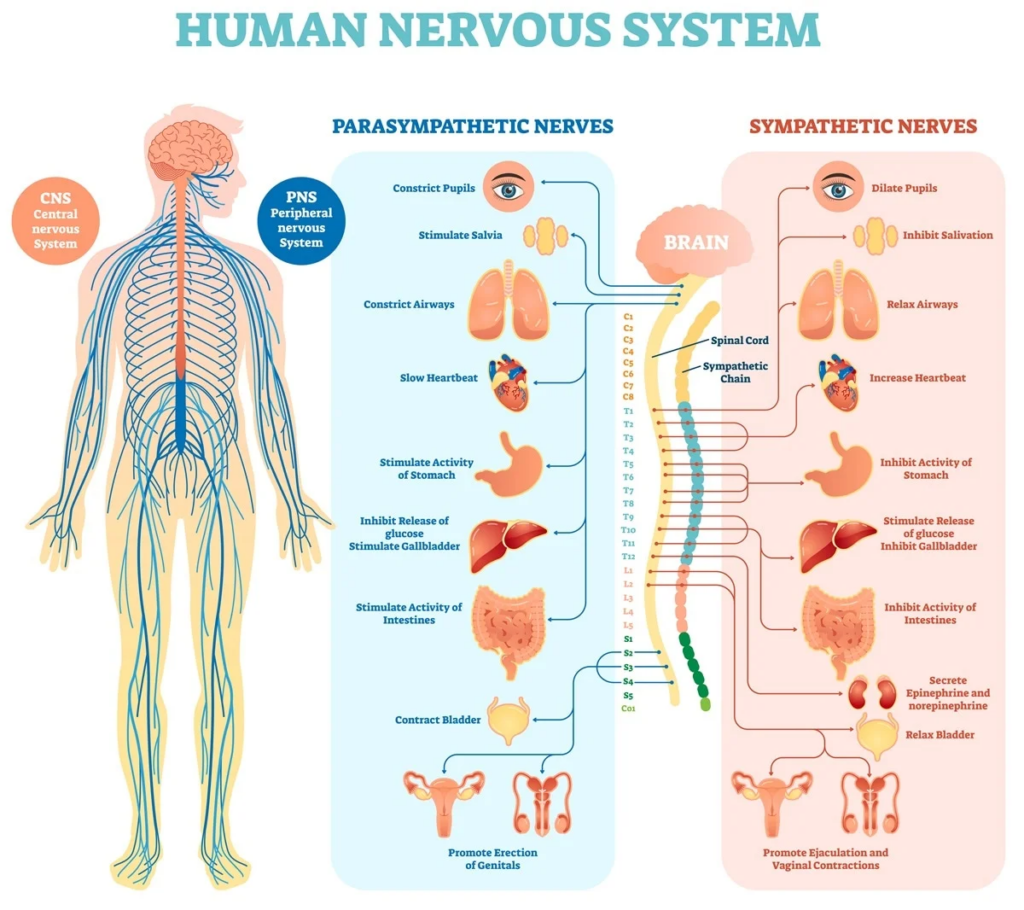Stress and Gut Health: Why It Matters and How to Manage It
Over the past decade, the spotlight on gut health has surged, transforming it from a relatively obscure aspect of our well-being into what is often referred to as the “second brain.” The gut plays a pivotal role in influencing various facets of our lives, from mood and cravings to overall immune function. Despite the common advice to “manage stress,” let’s now explore the direct impact of stress on our gut health. Stick around until the end, as we’ll explore actionable steps to effectively manage stress and optimize our nervous system.
Understanding the Nervous System

Source: News Medical Life Science
In essence, the nervous system orchestrates the seamless coordination of bodily functions, employing electrical signals as a communication network. Comprising the central nervous system (CNS) with the brain and spinal cord and the peripheral nervous system (PNS) with nerves throughout the body, the CNS governs all bodily functions, while the PNS handles voluntary actions and automatic processes like breathing and digestion.
The PNS, consisting of the somatic and autonomic nervous systems (ANS), is particularly significant. The ANS further divides into the sympathetic and parasympathetic systems. The sympathetic system triggers the familiar “fight or flight” response during stress, activating the body for rapid action, while the parasympathetic system facilitates relaxation and recovery.
The Modern-Day Dilemma and Its Consequences
In the contemporary context, the constant activation of the sympathetic system, originally designed for physical threats like encountering a bear, has become a chronic state for many due to everyday stressors such as urgent work emails. Living predominantly in this reactive mode has profound implications for our health, manifesting in issues like sleep disturbances, anxiety, blood sugar irregularities, sexual dysfunction, brain fog, and more. Alarming is the fact that our lifestyle choices have contributed to lifestyle-related diseases becoming the leading cause of mortality.
Rest and Digest
Recent research underscores the critical role of a healthy gut microbiome in our overall well-being. However, when trapped in the fight or flight mode, we hinder the essential process of “rest and digest,” impeding our ability to absorb nutrients effectively from the food we consume.
The Gut-Brain Axis
The gut-brain axis, the intricate connection between the gut and the brain, operates through neural pathways, chemical signals, and the immune system. This bidirectional communication profoundly influences digestion, emotions, and overall health. The gut produces chemicals, including hormones and neurotransmitters, that impact mood, behavior, and cognitive function. Notably, with 70-80% of immune cells residing in the gut, the profound influence of gut health on overall well-being becomes evident.
Stress and Gut Health

Digestive issues, a widespread concern affecting millions, are further exacerbated by stress, as indicated by Johns Hopkins Medicine. Stress disrupts nutrient breakdown and absorption, consequently contributing to common problems such as bloating and upset stomach. Additionally, gut motility, crucial for healthy digestion, is compromised, leading to issues like diarrhea or constipation.
Stress Busters: Nurturing Our Microbial Allies
The gut harbors a diverse community of microbes, collectively known as the gut microbiome. Striking a balance between beneficial and harmful microbes is crucial. However, stress tends to disrupt this equilibrium, favoring the proliferation of detrimental microbes. Consequently, this imbalance can lead to poor digestion, a weakened immune system, and a lower mood.
Addressing the Challenge: Practical Solutions
- Mindfulness:
– Notice stress signals.
– Practice simple techniques like deep breathing or structured exercises such as box breathing (inhale-hold-exhale-hold) for transitioning into the rest and digest mode. - Dietary Interventions:
– Adopt a gut-friendly diet rich in fiber from fruits, vegetables, whole grains, and legumes.
– Incorporate fermented foods like sauerkraut and kimchi to support a healthy gut microbiota.
– Minimize processed foods, sugary treats, and unhealthy fats to prevent disruption of gut balance. - Exercise:
– Regular physical activity stimulates gut motility, enhancing digestion and mood.
– Release feel-good hormones through exercise to support overall well-being. - Sleep:
– Prioritize 7-8 hours of quality sleep to promote gut-brain connection and reduce stress levels.
A Personalized Approach to Stress Management

Recognizing the undeniable link between stress, the nervous system, and gut health, it’s crucial to adopt a holistic approach to address these interconnected aspects of well-being. There’s no one-size-fits-all solution; individual needs may vary. Listening to your body and finding a tailored combination of stress management techniques, dietary adjustments, exercise, and self-care practices is key.
If you’re ready for personalized guidance and strategies, we’re here to accompany you on the journey to nurture a healthier gut and a happier you. Here’s to embracing less fight or flight and more rest and digest in our pursuit of well-being.
Join our FREE masterclass exploring the 3 Pillars of Gut Health—practical tips you can start using right away!
February 20, 2024
Leave a Reply Cancel reply
Podcast
Have you tuned in?
Let's Start Health; a podcast willing to start the awkward, vulnerable, and even hard conversations needed in order to break through stigmas of mental and physical health, as well as educate and inspire those on a journey to healing. Hosted by Chelsea Haines.
Be the first to comment